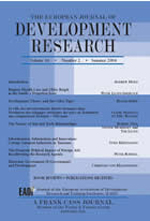The domestic political impact of foreign aid
‘The domestic political impact of foreign aid: recalibrating the research agenda’, European Journal of Development Research, 16: 2 (2004), pp. 396-416.
|
Abstract |
| The recent concentration of attention by some political scientists on evaluating the effectiveness of democracy assistance, drawing on the transient policy concerns of major donors, is a welcome innovation to a research agenda traditionally biased towards aid's significance for economic development. But its focus is restricted and unrepresentative. This article argues the case for a more comprehensive assessment of the domestic political consequences - both direct and indirect - of all forms of aid, in principle for aid recipients everywhere. This recommendation offers the advantage of serving the limited purposes of analysts of democratisation generally and democracy aid specifically, but more importantly reconnects their approach with the broader political analysis of aid by a wider social science community. It is important to 'think outside the box' of contemporary donor concerns, recalibrating the research agenda in ways that raise other political priorities. The article offers a framework for this purpose. Comprehending the political dynamics in aid-receiving countries should be the primary orienting principle, rather than viewing countries as objects of aid and proceeding to interpret their politics through the distorting lens of donor perspectives. |


